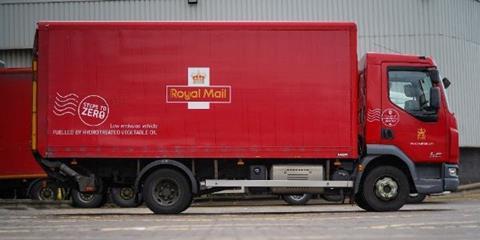
Royal Mail has launched a major strategy to cut its HGV fleet emissions by switching from diesel to Hydrotreated Vegetable Oil (HVO).
The first sites transitioning to HVO are Sheffield mail centre, the Midlands Super Hub and Royal Mail’s Manchester vehicle operating centre, with another four locations set to follow in the coming months.
All of the chosen locations have HGVs that move significant volumes for major customers. Royal Mail estimates using HVO at these sites will save a combined consumption of 2.1 million litres of diesel this year.
The transition to HVO is part of Royal Mail’s Steps to Zero plan – a drive to reduce its carbon emissions to net zero by 2040.
Under the plan, Royal Mail has a long-term target to reduce its average emissions per parcel to 50gCO2e. At 218gCO2e, Royal Mail claims it is already the UK’s greenest option for letters and parcels.
Royal Mail said the strategy to switch to HVO is also meeting growing demand from its customers to reduce emissions. It also plans to continue to increase its HVO deployment across its local and national distribution fleet network over the coming years, aiming to reduce its direct emissions by up to 200,000 tonnes of CO2e.
For the first year of deployment, Certas Energy will be supporting Royal Mail with its roll-out of HVO.
According to figures from Certas Energy, HVO is a drop-in, fossil-free biofuel that can cut up to 90% of greenhouse gas emissions and does not require any engine or fuelling infrastructure modifications.
Rob Fowler, Royal Mail fleet director, said: “We’ve made great progress in decarbonising our operation by introducing 5,000 electric vehicles into our final mile fleet but we also need to focus on our HGVs.
Read more
- Royal Mail cuts emissions with 3,000 more electric vehicles
- Royal Mail adds 29 Bio-CNG trucks to North West fleet
- PepsiCo ramps up HVO use in bid to cut emissions by 2,650 tonnes a year
“At present, the electric and hydrogen alternatives are still in development for HGVs. Vehicle ranges are low, purchase prices are high and infrastructure is in its infancy. That is why we have introduced the use of HVO to decarbonise the HGV fleet within our operation via the most viable low-carbon option.
“We consider HVO to be a transitional fuel that helps us to take steps towards decarbonising our HGV fleet whilst low-emissions technologies continue to advance in this area.
“We will continue to assess and test other emerging low emission technologies that we could potentially deploy in our larger fleet including electric and hydrogen HGVs. Many of these technologies are still in development and are currently not commercially viable to deploy at scale.”
Clive Betts, MP for Sheffield South East, said: “I welcome this initiative and hope it’s a first step on Royal Mail’s journey to reduce its carbon emissions from its larger fleet and reach net zero.”
Jamie Hodges, Certas Energy head of national accounts, added: “We are delighted to support Royal Mail in making significant strides in their energy transition.
“Certas Energy HVO is a transformative transitional fuel, helping Royal Mail to dramatically reduce emissions, with immediate effect and without sacrificing productivity.
“Certas Energy is not just a fuel and energy partner, we are also a road fleet operator, so we appreciate the decarbonisation challenges facing the industry.
“After exceeding our own 2025 carbon reduction target three years ahead of schedule, thanks to our successful trial of HVO across our depot network, we have every confidence that the renewable fuel will play a pivotal and positive role in plugging the gap to net zero.
“We are dedicated to helping businesses solve the ‘energy trilemma’ and we hope the example set by Royal Mail will inspire others in the industry to take action to accelerate their own sustainability efforts.”
For more stories tracking the industry journey to decarbonisation see our new Freight Carbon Zero website.














